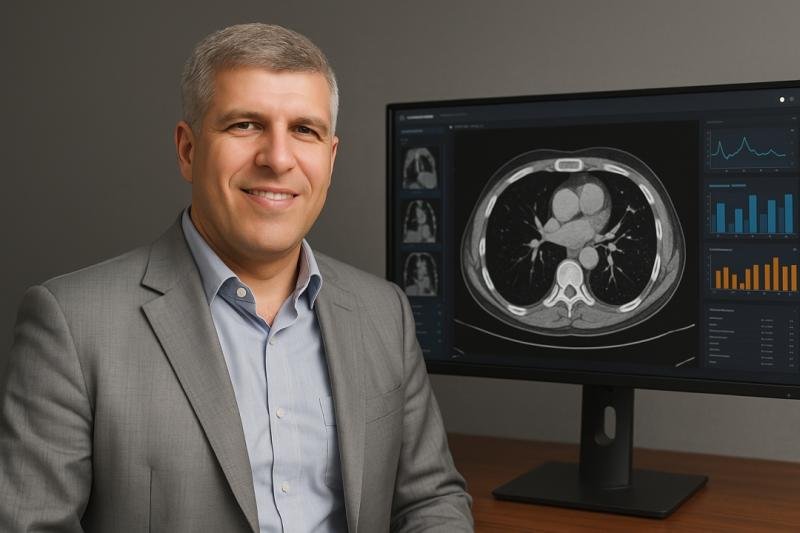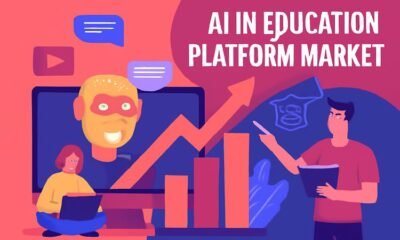AI Research
Artificial Intelligence Reshapes Diagnostic Imaging for Early

Artificial intelligence gives us the ability to see what the human eye might missand to act before its too late. This is not just a technological advancement; its a shift in how we protect lives, deliver care, and ensure no patient is left behind.
Healthcare visionary Hugo Raposo unveils scalable imaging solution to flag critical conditions before symptoms appear.
A quiet breakthrough is unfolding in medical imaging-and it’s powered not by new machines, but by new intelligence. Canadian technology strategist Hugo Raposo [https://www.linkedin.com/in/hugoraposo/] has developed an artificial intelligence platform that rapidly analyzes diagnostic images to detect early signs of disease, with the potential to transform patient outcomes at scale.
From routine X-rays to advanced MRI and CT scans [https://www.fda.gov/media/145022/download], the platform acts as an intelligent assistant [https://pmc.ncbi.nlm.nih.gov/articles/PMC10082037/]-one that never tires, forgets, or overlooks the fine details. Deployed in select clinical settings across Ontario, it has already shown promise in reducing diagnostic delays and identifying at-risk patients long before symptoms surface.
Automating the Invisible: A Second Set of Eyes for Every Scan
Built on machine learning and advanced pattern recognition, the platform interprets clinical images in real time, surfacing subtle abnormalities that might escape even experienced eyes under pressure.
It’s not just about speed-it’s about catching what would otherwise be missed:
* Tiny lung nodules that could signal early cancer
* Microbleeds pointing to stroke risk
* Retinal damage indicative of diabetes or neurodegeneration
* Bone or spinal anomalies that don’t yet cause pain
“Radiologists are under immense strain,” said one Toronto-based imaging lead familiar with the rollout. “This kind of tool doesn’t just help-it protects. It extends the quality of care without increasing the workload.”
About the Architect Behind the Platform
Hugo Raposo [https://www.linkedin.com/in/hugoraposo/] is no stranger to complex healthcare challenges. With nearly three decades of experience in enterprise architecture and digital health, he served as Chief Architect for one of Canada’s largest provincial healthcare transformation programs. His work bridges clinical operations, AI innovation, and scalable infrastructure-often with an emphasis on underserved or high-risk populations.
He has advised executive teams, contributed to public-sector modernization, and spoken internationally on the intersection of technology and health equity.
More on Raposo: linkedin.com/in/hugoraposo [https://www.linkedin.com/in/hugoraposo]
Real-World Results and Clinical Potential
In early deployments, Raposo’s platform has helped care teams:
* Flag critical findings up to 48 hours earlier
* Reduce missed abnormalities in high-volume radiology centers
* Increase detection sensitivity above 90% across selected use cases
* Improve prioritization for follow-up care and referrals
One pilot site saw a drop in unnecessary imaging repeat requests within weeks-thanks to clearer, AI-assisted reporting. Another clinic, serving a rural population, credited the system with improving access to rapid pre-screening where radiologist review was delayed.
Beyond Hospitals: Designing for Accessibility
Unlike many AI health tools that remain confined to research labs or top-tier institutions, this system was designed for broad use. It operates with or without cloud access, supports mobile deployments, and integrates into existing PACS and EHR systems.
“We didn’t build this for showcase hospitals,” Raposo said in an interview. “We built it for the real world-where a delay in reading a scan can mean the difference between early treatment and emergency surgery.”
The technology adheres to privacy-by-design principles, using federated learning to prevent raw image data from leaving local environments. Model updates and quality controls are handled through a rigorous oversight framework, with bias mitigation and auditability at the core.
Policy Alignment and Global Relevance
With the U.S. and Canada facing rising diagnostic backlogs, Raposo’s work intersects with key national goals:
* Accelerating adoption of AI in radiology
* Supporting value-based care and early intervention
* Extending diagnostic capacity to rural, Indigenous, and underserved populations
The system’s compatibility with both urban and low-resource clinical settings positions it as a candidate for broader adoption in public health and emergency response networks.
What Comes Next
Raposo is advancing the platform’s capabilities to analyze cardiovascular scans and identify early indicators of cognitive decline. He is also developing multi-modality correlation features that link insights across radiology, pathology, and lab data-creating a comprehensive diagnostic profile driven by artificial intelligence.
“This is just the beginning,” Raposo said. “We’re not replacing clinicians. We’re giving them clarity faster, and with that, the power to intervene sooner.”
Media Contact
Company Name: Contatto Media Agency
Contact Person: Boracini, Paula
Email:Send Email [https://www.abnewswire.com/email_contact_us.php?pr=artificial-intelligence-reshapes-diagnostic-imaging-for-early-disease-detection]
Country: Canada
Website: https://www.agenciacontatto.com.br
Legal Disclaimer: Information contained on this page is provided by an independent third-party content provider. ABNewswire makes no warranties or responsibility or liability for the accuracy, content, images, videos, licenses, completeness, legality, or reliability of the information contained in this article. If you are affiliated with this article or have any complaints or copyright issues related to this article and would like it to be removed, please contact retract@swscontact.com
This release was published on openPR.
AI Research
Now Artificial Intelligence (AI) for smarter prison surveillance in West Bengal – The CSR Journal
AI Research
OpenAI business to burn $115 billion through 2029 The Information

OpenAI CEO Sam Altman walks on the day of a meeting of the White House Task Force on Artificial Intelligence (AI) Education in the East Room at the White House in Washington, D.C., U.S., September 4, 2025.
Brian Snyder | Reuters
OpenAI has sharply raised its projected cash burn through 2029 to $115 billion as it ramps up spending to power the artificial intelligence behind its popular ChatGPT chatbot, The Information reported on Friday.
The new forecast is $80 billion higher than the company previously expected, the news outlet said, without citing a source for the report.
OpenAI, which has become one of the world’s biggest renters of cloud servers, projects it will burn more than $8 billion this year, some $1.5 billion higher than its projection from earlier this year, the report said.
The company did not immediately respond to Reuters request for comment.
To control its soaring costs, OpenAI will seek to develop its own data center server chips and facilities to power its technology, The Information said.
OpenAI is set to produce its first artificial intelligence chip next year in partnership with U.S. semiconductor giant Broadcom, the Financial Times reported on Thursday, saying OpenAI plans to use the chip internally rather than make it available to customers.
The company deepened its tie-up with Oracle in July with a planned 4.5-gigawatts of data center capacity, building on its Stargate initiative, a project of up to $500 billion and 10 gigawatts that includes Japanese technology investor SoftBank. OpenAI has also added Alphabet’s Google Cloud among its suppliers for computing capacity.
The company’s cash burn will more than double to over $17 billion next year, $10 billion higher than OpenAI’s earlier projection, with a burn of $35 billion in 2027 and $45 billion in 2028, The Information said.
AI Research
Who is Shawn Shen? The Cambridge alumnus and ex-Meta scientist offering $2M to poach AI researchers

Shawn Shen, co-founder and Chief Executive Officer of the artificial intelligence (AI) startup Memories.ai, has made headlines for offering compensation packages worth up to $2 million to attract researchers from top technology companies. In a recent interview with Business Insider, Shen explained that many scientists are leaving Meta, the parent company of Facebook, due to constant reorganisations and shifting priorities.“Meta is constantly doing reorganizations. Your manager and your goals can change every few months. For some researchers, it can be really frustrating and feel like a waste of time,” Shen told Business Insider, adding that this is a key reason why researchers are seeking roles at startups. He also cited Meta Chief Executive Officer Mark Zuckerberg’s philosophy that “the biggest risk is not taking any risks” as a motivation for his own move into entrepreneurship.With Memories.ai, a company developing AI capable of understanding and remembering visual data, Shen is aiming to build a niche team of elite researchers. His company has already recruited Chi-Hao Wu, a former Meta research scientist, as Chief AI Officer, and is in talks with other researchers from Meta’s Superintelligence Lab as well as Google DeepMind.
From full scholarships to Cambridge classrooms
Shen’s academic journey is rooted in engineering, supported consistently by merit-based scholarships. He studied at Dulwich College from 2013 to 2016 on a full scholarship, completing his A-Level qualifications.He then pursued higher education at the University of Cambridge, where he was awarded full scholarships throughout. Shen earned a Bachelor of Arts (BA) in Engineering (2016–2019), followed by a Master of Engineering (MEng) at Trinity College (2019–2020). He later continued at Cambridge as a Meta PhD Fellow, completing his Doctor of Philosophy (PhD) in Engineering between 2020 and 2023.
Early career: Internships in finance and research
Alongside his academic pursuits, Shen gained early experience through internships and analyst roles in finance. He worked as a Quantitative Research Summer Analyst at Killik & Co in London (2017) and as an Investment Banking Summer Analyst at Morgan Stanley in Shanghai (2018).Shen also interned as a Research Scientist at the Computational and Biological Learning Lab at the University of Cambridge (2019), building the foundations for his transition into advanced AI research.
From Meta’s Reality Labs to academia
After completing his PhD, Shen joined Meta (Reality Labs Research) in Redmond, Washington, as a Research Scientist (2022–2024). His time at Meta exposed him to cutting-edge work in generative AI, but also to the frustrations of frequent corporate restructuring. This experience eventually drove him toward building his own company.In April 2024, Shen began his academic career as an Assistant Professor at the University of Bristol, before launching Memories.ai in October 2024.
Betting on talent with $2M offers
Explaining his company’s aggressive hiring packages, Shen told Business Insider: “It’s because of the talent war that was started by Mark Zuckerberg. I used to work at Meta, and I speak with my former colleagues often about this. When I heard about their compensation packages, I was shocked — it’s really in the tens of millions range. But it shows that in this age, AI researchers who make the best models and stand at the frontier of technology are really worth this amount of money.”Shen noted that Memories.ai is looking to recruit three to five researchers in the next six months, followed by up to ten more within a year. The company is prioritising individuals willing to take a mix of equity and cash, with Shen emphasising that these recruits would be treated as founding members rather than employees.By betting heavily on talent, Shen believes Memories.ai will be in a strong position to secure additional funding and establish itself in the competitive AI landscape.His bold $2 million offers may raise eyebrows, but they also underline a larger truth: in today’s technology race, the fiercest competition is not for customers or capital, it’s for talent.
-

 Business1 week ago
Business1 week agoThe Guardian view on Trump and the Fed: independence is no substitute for accountability | Editorial
-
Tools & Platforms4 weeks ago
Building Trust in Military AI Starts with Opening the Black Box – War on the Rocks
-

 Ethics & Policy1 month ago
Ethics & Policy1 month agoSDAIA Supports Saudi Arabia’s Leadership in Shaping Global AI Ethics, Policy, and Research – وكالة الأنباء السعودية
-

 Events & Conferences4 months ago
Events & Conferences4 months agoJourney to 1000 models: Scaling Instagram’s recommendation system
-

 Jobs & Careers2 months ago
Jobs & Careers2 months agoMumbai-based Perplexity Alternative Has 60k+ Users Without Funding
-

 Education2 months ago
Education2 months agoVEX Robotics launches AI-powered classroom robotics system
-

 Podcasts & Talks2 months ago
Podcasts & Talks2 months agoHappy 4th of July! 🎆 Made with Veo 3 in Gemini
-

 Education2 months ago
Education2 months agoMacron says UK and France have duty to tackle illegal migration ‘with humanity, solidarity and firmness’ – UK politics live | Politics
-

 Funding & Business2 months ago
Funding & Business2 months agoKayak and Expedia race to build AI travel agents that turn social posts into itineraries
-

 Podcasts & Talks2 months ago
Podcasts & Talks2 months agoOpenAI 🤝 @teamganassi






















